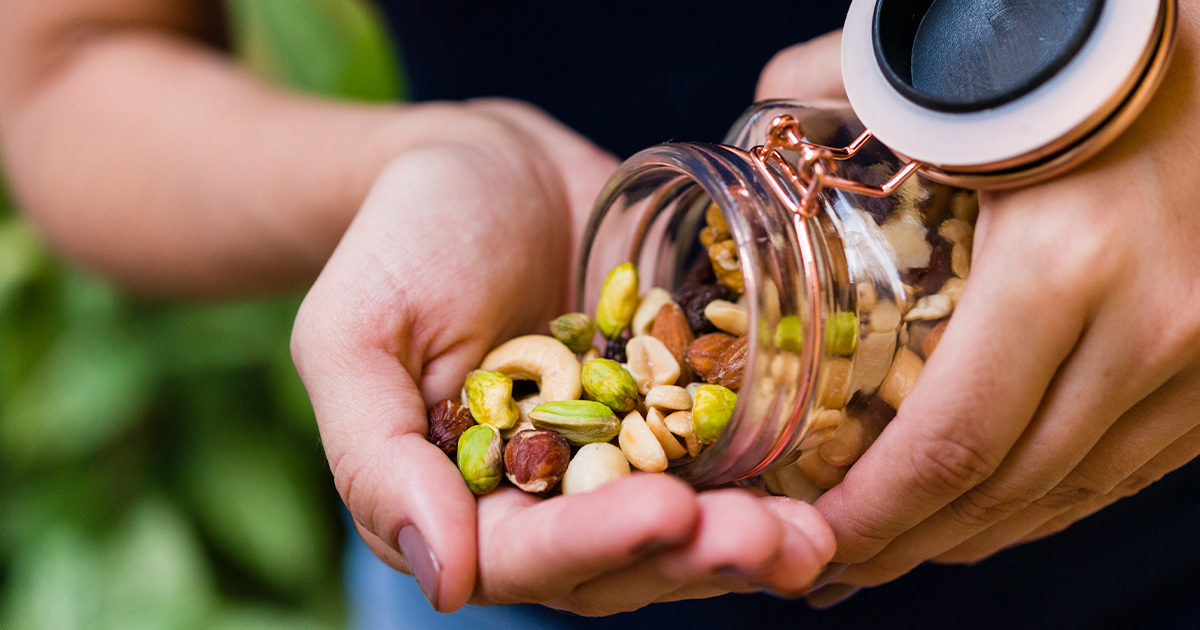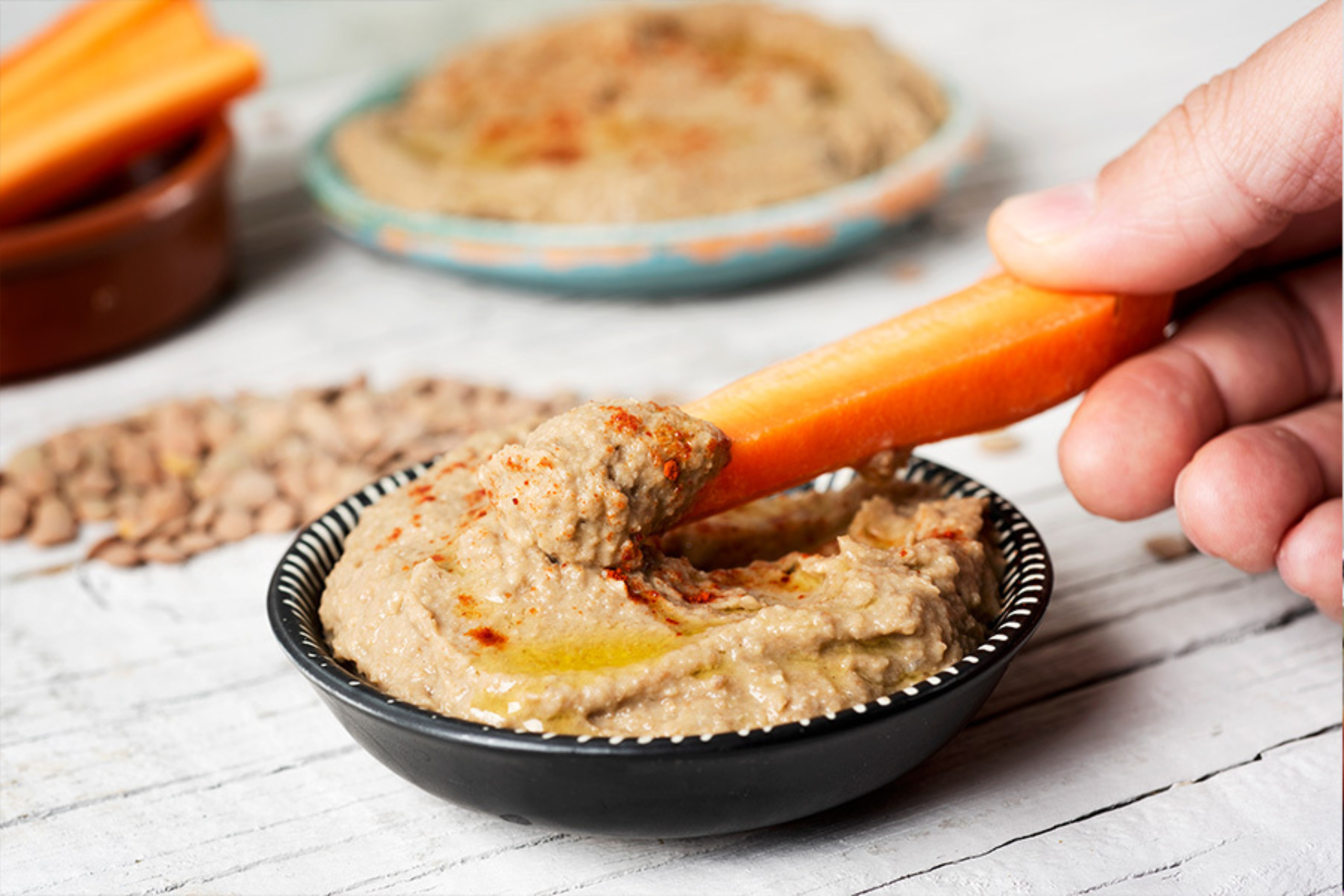Snacking Smarter in the New Year
Tips for setting and achieving healthier eating goals
Reviewed by: Krystle Zuniga, PhD, RD, LD
Written by: Ashley Lawrence

The beginning of a new year is often viewed as an opportunity for a fresh start. For many, it’s a time to reevaluate one’s current lifestyle with the intentions of creating habits that lead to a healthier, happier, and longer life. When approaching the new year from the perspective of a clean slate, dietitian Krystle Zuniga, PhD, RD, LD of the Health Social Work care team at UT Health Austin reminds us that no goal is too small.
“I think the biggest mistake that people tend to make, not just going into the new year, but also throughout the year, is they decide that starting tomorrow, they are going to overhaul their entire life to meet these big goals they’ve set for themselves. When people decide to tackle major lifestyle changes without preparation, they tend to find that what they’re trying to accomplish is really difficult, causing them to give up entirely,” says Dr. Zuniga.
Setting Small, Achievable Goals
As we head into the new year, many of us are struggling with pandemic fatigue, the state of being worn out by the recommended precautions and restrictions in place as well as the intense emotions and lack of social engagement related to the ongoing global pandemic. While major changes to your diet may be on the agenda for 2021, meal planning takes a lot of your brain’s resources—many of which have been allocated this past year to navigating a new home and work environment as well as new workplace and community restrictions, changing local and state guidelines, and the emotional toll of dealing with the unknown.
“When you go from grabbing takeout a couple times a week to trying to cook all your meals from home, there’s a lot of discipline and time management that goes into that,” explains Dr. Zuniga. “Making lifestyle behavior changes takes time. Everyone knows you don’t just go out and run a marathon. You have to train, starting small as you build up your endurance. The same approach can be applied to your diet. I advocate for SMART goal setting where you set specific, measurable, and realistic goals that will set you up for success. From there, you can build on that success, gaining momentum that will help get you that much closer to meeting your larger goal.”
Small changes to your diet can make significant impacts on your health, especially when those changes take place consistently over time. Set SMART goals, or goals that are Specific, Measurable, Achievable, Relevant, and Time bound. Setting clear, trackable, reachable, realistic, and carefully planned goals will set you up for success. Maybe you start with adding a serving of vegetables at dinner five times per week for one month and then gradually increase your vegetable intake each month until you become accustomed to incorporating several servings of vegetables into your diet daily. Or maybe you start scheduling a 10-minute walk during your lunch break over the next two months and then build on that amount of exercise each month until you’re ready to commit to 150 minutes of moderate aerobic activity (or even 75 minutes of vigorous activity) each week.

Snacking
A snack is a small amount of food that is eaten between meals. While dependent on your level of activity, a snack is generally around 100 to 200 calories. Snacking can be a great option when trying to curb hunger between meals, satisfy a craving to avoid overeating at mealtime, or provide your body with a boost of fuel to give you added energy and help you focus.
“There’s really no right or wrong way to approach how often you should snack,” says Dr. Zuniga. “Some people prefer eating small snacks throughout the day as that can be less daunting than having to prepare meals. A general rule of thumb is to try not to go longer than four hours without eating as your blood sugar can get low, causing you to become tired, dizzy, or irritable, which can greatly affect your overall mood and energy levels.”
As we continue to navigate the global pandemic, many employees have reported that their workloads have increased, causing them to work more hours. Navigating this work environment can majorly affect our daily eating habits. Whereas before you may have had a designated lunch break, you may now be allocating that time to carrying out additional work duties. This can interfere with meal planning and makes it more difficult to schedule a quick snack break. Find time to carve out 15-20 minutes dedicated to eating a snack that will satisfy your body and provide you with the energy you need to carry on throughout the day.
Practicing Mindful Snacking
Because snacking often occurs on the go, in the car, at your desk, or just not in a formal dining setting while sitting with your food portioned out on a plate in front of you, you’re more likely to have a less mindful eating experience. Try to treat snacking as an isolated event, taking time to indulge in the aroma and flavor of the foods you eat while also paying attention to the color and texture of the food as well as the sounds you hear.
“Oftentimes, people mention skipping breakfast because they aren’t hungry,” says Dr. Zuniga. “Your body likely is hungry, but your mind is occupied with dropping your kids off at school, trying to make it to work on time, or busying itself with some other task. When people go extended periods of time without eating, they tend to be triggered by a certain level of hunger that may make them feel irritable, or ‘hangry.’ When you experience hunger pains, you’re less likely to think about what the most nutritious option available to you is or what type of food would be best for your body to keep you operating at the optimal level.”
Be mindful of what your body is telling you by paying close attention to when your body is hungry to avoid overeating, indulging in unhealthy food options, or even eating when you aren’t hungry. Plan ahead by portioning out nutritious snacks before the start of your workday. Having ready-made and convenient snack options can help you avoid mindless eating and keep you sustained while on the go.

Exploring Snack Options
Snacks consisting of a good mixture of protein and complex carbohydrates are more satisfying and are going to keep you fuller for a longer period of time. Healthy snack options can include whole grain crackers with hummus or a small serving of tuna salad, whole grain pretzels with peanut butter, a piece of fruit with low-fat cheese or sliced deli meat, tortilla chips with salsa, low-fat yogurt with granola, or even roasted chickpeas.
“While a piece of fruit is a great snack, pairing the fruit with one ounce of nuts, one ounce of cheese, or a tablespoon of peanut butter will help keep you from being hungry an hour later,” explains Dr. Zuniga. “Dried fruit or trail mix is another great option for people on the go or who may be working outdoors and have limited access to appliances, such as refrigerators or microwaves. I encourage people to make their own trail mix, adding in nuts, fruits, and maybe even some pretzels, to avoid the extra sugar that comes in store-bought trail mixes that contain chocolate or candy.”
Try to limit packaged and highly processed foods and foods that are high in sugar, high in fat, or high in sodium. While these foods may be savory in the moment, they are not good sources of nutrient-dense energy. You want to make sure your body is fueled by a whole food source of nutrition.
“Always look past the front package of any food source,” encourages Dr. Zuniga. “While packaging may claim the food is high in protein or plant-based, it can also be high in fat or high in sodium. Take a look at the nutritional facts panel. If you see fat or sugar listed on the top of the ingredient list, you may want to consider another snack option.”
We’ve all been through a lot over the last year and many of us are ready for a new start. Remember, it’s okay to take on one small change at a time. While your results may take longer, being mindful of what you can change today will help you achieve the sustainable success you’re looking for.
Depending on your specific healthcare needs, a dietitian may be a part of your healthcare journey at UT Health Austin.
Cheers to you and all that you choose to pursue throughout the year!
<br>To request an appointment with UT Health Austin, call 1-833-UT-CARES (1-833-882-2737) or visit here.